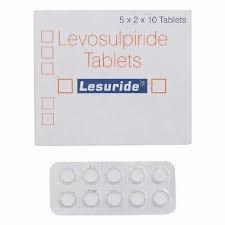LEVOSULPIRIDE
LEVOSULPIRIDE: Levosulpiride is a drug used mainly in the treatment of gastrointestinal disorders. It belongs to a class of drugs known as selective dopamine D2 receptor antagonists.
The primary use of levosulpiride is to improve symptoms related to functional dyspepsia and gastroesophageal reflux disease (GERD). It works by blocking the dopamine receptors in the brain and gastrointestinal system, which helps to regulate the release of stomach acid and improve the coordination of stomach movements.
Levosulpiride is available in tablet and capsule forms, and the recommended dose may vary depending on the condition being treated. Commonly, doctors may prescribe 25 to 50 mg of levosulpiride three times a day.
Like most medications, levosulpiride can cause some side effects. The most common ones include extrapyramidal symptoms such as tremors, muscle stiffness, restlessness, and involuntary movements. Other side effects may include dizziness, headache, fatigue, sleep disturbances, increased prolactin levels (which can cause breast enlargement and secretion of milk), and menstrual irregularities in women.
It’s essential to consult a healthcare professional before starting levosulpiride, as they can determine the appropriate dose and monitor for any potential side effects or drug interactions.


